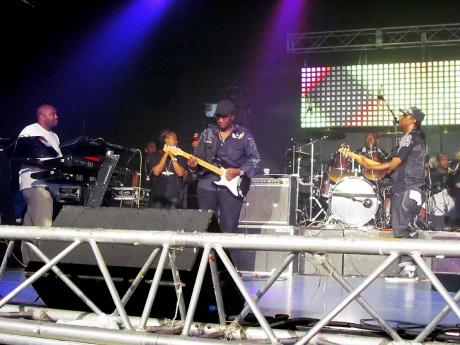All for one and one for all! - Backing bands, earn points, create brands to forward into the future
Crafting an image to accompany their sound has largely become the focus for contemporary musicians. But the only signature image some will ever own is a silhouette behind bright stage lights. The world's most fanatical music lover attending numerous live shows for recording artistes may never know the names of the men (or women) who cue show time with the tap of the drumsticks. This is what the life of a backing band is like.
Nonetheless, backing bands are an important part of the local music industry, performing with entertainers at shows such as Rebel Salute, Shaggy and Friends, Reggae Sumfest, and an even greater number of minor events. The unwritten rule: never outdo the artiste.
According to popular guitarist and member of Rawsoul Rebels: Almando 'Mundo' Douglas, the most challenging task is working with several artistes at one time.
"Most times, we can expect that live stage shows like Reggae Sumfest will feature over 10 artistes, which means over 10 different personalities that you may not like working with - but you just do it because."
Musicians sometimes spend days in a studio rehearsing special arrangements or figuring out an artiste's styles. One thing's for sure, if there is no chemistry with the singer, the audience will know.
Survival of the fittest
The life of a backing band is not always glamorous - travelling together for months at a time on a tour bus dealing with some very harsh conditions. Mundo recalls, "Once during the cold winter, we arrived at a hotel, and just our luck, there were no rooms available for us. We had to sleep in a Walmart parking lot in a Sprinter van - equipment, luggage, and all."
For reasons like this and more, a number of popular Jamaican backing bands have shied away from a support role to focus on being stand-alone units. For example: Live Wyya, while acting as a backing band for Gregory Isaacs, was able to develop a distinct image, having the opportunity to share their own music and earn points while touring with the renowned reggae singer.
In the same breath, backing bands-turned-show bands may build their musical reputation but put most of the profit towards the brand. Singer Chevaughn, who had been a long-standing member of C-Sharp Band, which was formed over 15 years ago while the members were studying at the Edna Manley College of the Visual and Perfroming Arts, told The Sunday Gleaner, "Starting a band is like a comfort zone for students learning together, trying to find a common ground to hone their craft. There have to be lines drawn to know what the aim at the end of the day is because creating your own music and image can damage the dynamic," he said. "It is not the smoothest ride when you are investing in your own work. We spent 70 to 85 per cent reinvesting into C-Sharp."
They, too, became a premier backing band on the island supporting Tarrus Riley, Rita Marley, Junior Gong, Chaka Demus and Pliers, and the likes, although for the past four years C-Sharp has not acted as a group.
No demand
Fab Five's vocalist and musical director Asley Grub Cooper said most freelance musicians survive by being on the road.
"Making a living back in the late '60s going on to the '80s, you would find that most entertainment places - nightclubs, bars - all had a resident band," said Cooper.
"For example, Red Hills Road was the hip strip. If there were 10 clubs, all 10 had a band," he added.
The challenge for backing bands such as Fyah Full and Ruff Kutt, or those that decided to take centre stage like Live Wyya, Katalyst Krew, Gumption Band, and Raging Fyah, is the lack of demand or hot spots as Cooper describes, but mostly having to compete with the digital era. For this reason, Cooper describes live music as a way to life, as a dying breed.
Ruff Kutt is probably one of the longest existing and highly requested bands to back artistes locally and internationally. Whatever their recipe for success, it is commendable, that they have been able to create an appetising musical menu, while for others, being the 'back-up' is not as satisfying. The next time you attend a live show, take a bite out of the band that's playing tune into the instruments.




